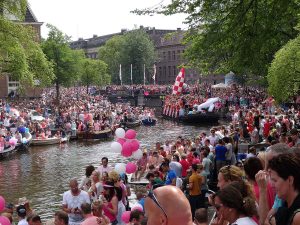 Friday 29 May 2020. The Dutch Centre for Intangible Cultural Heritage, announces the conference ‘Intangible Heritage as Tourist Destination’, organized in close collaboration with Erfgoed Gelderland (Heritage Gelderland) and with tourism educators and researchers from colleges and universities in the Netherlands as well as Volkskunde journal, that will publish a theme issue on the same topic.
Friday 29 May 2020. The Dutch Centre for Intangible Cultural Heritage, announces the conference ‘Intangible Heritage as Tourist Destination’, organized in close collaboration with Erfgoed Gelderland (Heritage Gelderland) and with tourism educators and researchers from colleges and universities in the Netherlands as well as Volkskunde journal, that will publish a theme issue on the same topic.
This call applies to a call for presentations for the conference as as well a call for papers for Volkskunde.
Heritage tourism is currently a much-discussed topic. Europe’s rich past and cultural heritage has led some to claim that Europe’s future lies in tourism. Others underscore the risks of “over-tourism”, which threatens to erode not only the pleasures of tourism but European quality of life. Cities such as Venice, Barcelona, and Amsterdam have sounded the alarm because they are flooded with unmanageable numbers of tourists.
Since the 2003 UNESCO Convention for the Safeguarding of Intangible Cultural Heritage there is growing awareness of the potential of Intangible Heritage Tourism. The UN World Tourism Organization recognized this in 2008. In an influential report ‘Intangible Heritage and Tourism’ UNWTO explored strategies to showcase ICH, developing and bundling attractions for stronger market appeal, amongst other things using or reviving festivals and events.
Some believe intangible heritage might be developed as an attractive niche market, capable of diverting and diluting the ever-expanding flow of tourists. As an experiential activity involving ‘living’ heritage, intangible heritage has tremendous potential drawing-power for tourists. After all, many tourists hope to experience the “local colour” of the regions they visit. If developed and managed correctly, some scholars feel that local communities can also benefit from intangible heritage tourism, both economically and in terms of safeguarding their heritage-related practices. However, intangible heritage is not immune to the over-tourism that has eroded the quality of life in ‘material’ heritage destinations such as Florence. For instance, New Orleans has long drawn tourists for its Mardi Gras festivities, Cajun culture, and jazz traditions, but in recent years over-tourism has led to unmanageable crowds, Airbnb-induced rent hikes that are displacing locals, and growing unhappiness with tourism. While many intangible heritage communities recognize the potential of tourism, they also fear becoming “a second New Orleans or a second Amsterdam.”
Interestingly, intangible heritage is not limited to traditional folk culture (handicrafts, culinary practices, music, and ritual events). A busy shopping street such as the West-Kruiskade in Rotterdam derives its appeal, to a large extent, from the rich diversity of expressions of intangible heritage. Likewise, intangible heritage tourism has arisen from the activities of diverse ethnic entrepreneurs, who stage events and festivals, such as the Chinese Dragon Festival. Likewise, Gay Pride, the annual colourful procession through the canals of Amsterdam or the streets of San Francisco, is no longer a festival for a limited target group but has become a broader celebration drawing tourists from afar.
Questions concerning intangible heritage for tourists include: How does a community successfully promote intangible heritage for tourism, making it an attractive niche market? Can the original (pre-tourism) understandings of the intangible heritage practices be preserved? Is this a reasonable aim? In other words, are there tensions between commercialization and the desire for “authenticity” both within intangible heritage communities and (differently) with tourists? “Authenticity” is in the “eye of the beholder,” but the experience behind it is not without significance for all involved and therefore worthy of investigation.
The journal Volkskunde is seeking compelling case studies from around the world that will foster reflection and insights into the aforementioned issues. Both more theoretical and practice-oriented contributions are welcome. Papers may address areas of tension and/or shed additional light on relationships amongst local communities, tourists, and/or intangible heritage entrepreneurs (museum officials, historical societies, neighbourhood associations, etc). Practice-oriented papers might entail addressing topics such as cultural routes, “augmented reality,” or apps to “unlock” intangible heritage (such as narratives to “Bruegel walks” or Brussels beer tours). Papers that can also lend themselves to a presentation at the symposium on Friday 29 May 2020 are especially desired. Faculty and graduate students are also cordially invited to submit their 200-500 word proposals.
BEFORE 1 DECEMBER 2019 to redactie@volkskunde.be.
The conference is an initiative of the Dutch Centre for Intangible Cultural Heritage. For more information Albert van der Zeijden, a.vanderzeijden@immaterieelerfgoed.nl.


I am Dr. Avkash Jadhav. I am a heritage activist from Mumbai. India. I would like to present my case study in the form of a research paper. Is there any provision for travel assistance and funding to participate in the conference. Kindly let me know. Good wishes to you and your team.
Hi Albert.
My name is María Eugenia Peltzer, I am an anthropologist and I have an Intangible Cultural Heritage Chair at the National University of La Plata in Argentina. I am interested in participating in the ‘Intangible Heritage as Tourist Destination’ event, with two presentations on May 29 next year. Will it be possible for me to be accepted? One of my papers would be about my country, and the other about the Intangible Cultural Heritage and Hereward the Wake with David Maile who is the director of the WakeHereward project. The day is May 29 only? or is it two days? I thank you for all the information you can give me and I remain at your disposal.
Best regards,
María Eugenia Peltzer
The conference is an initiative of the Dutch Centre for Intangible Cultural Heritage. For more information Albert van der Zeijden, a.vanderzeijden@immaterieelerfgoed.nl.